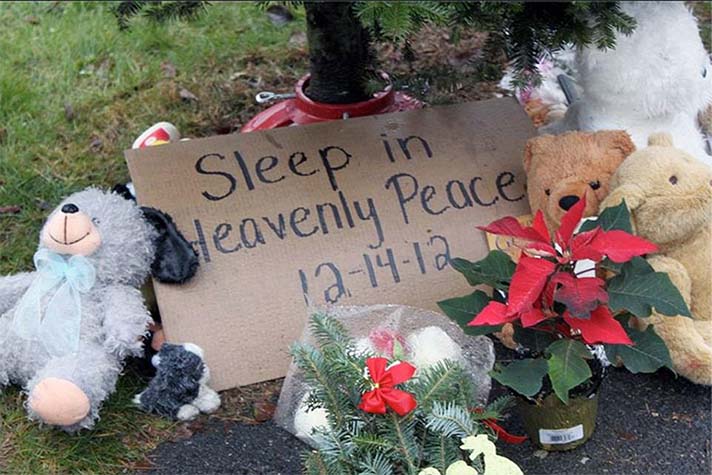
On this day four years ago, crisis-trained chaplains with the Billy Graham Rapid Response Team arrived on the scene of the Sandy Hook Elementary School shooting. This story, written in June 2013, looks back on their time in Newtown:
It’s been six months since ten chaplains felt their hearts break as they drove into the shell-shocked village of Sandy Hook, inside Newtown, Conn.
The Dec. 14 shooting left 26 people, including 20 elementary school children, dead. It left parents, teachers, and first responders drowning in grief two weeks before Christmas.
The crisis-trained Billy Graham Rapid Response chaplains who ministered in Sandy Hook have since gone back to their homes and families. Time has marched on, but the sights and sounds of the traumatized community are seared into their memories.
“It was probably the worst deployment we’ve ever been on.” said chaplain Barb Grabowski. “The most shattering.”
Barb and her husband Leo, a retired police officer, traveled to Newtown, Conn., from their home in Fort Mill, S.C. Once there, they met up with eight other seasoned chaplains, including Ray and Suzanne Thompson from Laguna Niguel, Calif.
“Everybody was in shock,” said Barb Grabowski. “It was probably the strangest atmosphere I had ever been in. You just felt this quietness over the town.”
The chaplains who deployed to Newtown were some of the Rapid Response Team’s most experienced. They had responded to deadly tornadoes and hurricanes, earthquakes and wildfires, even the Aurora, Colo., movie theater shooting. There was still no way to prepare for Sandy Hook.
“These were children,” said Barb Grabowski. “It just didn’t make any sense.”
Inside Newtown’s ‘Ground Zero’
Praying God would use them wherever they were most needed, the chaplains found doors opening, leading them into the heart of the trauma.
“We were all in a counseling room with the teachers when they found out the kids who were alive and dead,” said Barb Grabowski.
“They would say a name,” said Leo Grabowski. “A teacher would say, ‘He’s dead.”
The chaplains described some of the teachers as being almost in a trance. One by one, their students’ names were read.
“You’d hear, ‘She didn’t make it. She’s dead,'” said Leo Grabowski. “So what do you do? You can’t say a scripture verse. You just sit with them.”
Sandy Hook was the ultimate test of the chaplains’ faith and training. They had to dig deep to help others process a tragedy they couldn’t understand themselves. By the grace of God, they were able to persist. Along the way, they learned some lessons that could help others reach out to friends and family who are going through their own personal tragedies.
Pray Without Ceasing
It’s one of the shortest verses in the Bible, but 1 Thessalonians 5:17 is critical. It simply says, “Pray without ceasing.” (NKJV)
When Ray and Suzanne Thompson arrived in Newtown, the first thing they did was meet up with another pair of chaplains to pray.
“We pulled over into a little parking lot, and we prayed,” said Suzanne Thompson. “You can’t do anything until you bring the Lord into it.”
Throughout their time in Newtown, the chaplains called on the Lord frequently. Prayer, they said, is the only thing that allowed them to keep going.
“You have to totally rely on the Lord,” said Suzanne Thompson. “I get to a place where I can’t do it. I cannot do it. You pray every moment.”
Quick to Listen, Slow to Speak
James 1:19 calls believers to speak less and listen more. This is a command the Rapid Response chaplains take very seriously in times of trouble.
“People in that state aren’t in any condition to be listening to other peoples’ stories,” said Suzanne Thompson. “The main thing is to listen to them.”
“You don’t compare it,” said Leo Grabowski. “This is their trauma. This is their tragedy.”
The chaplains also respected the fact that not everyone was immediately able to speak about what they had experienced. In those situations, they said it’s important to let the grieving person know that the lines of communication are open, and that you’ll be there when the time is right.
“We’ve got to give them room,” said Barb Grabowski. “But keep those lines open. Be there for them.”
Weep with Those Who Weep
In Sandy Hook, the chaplains shed far more tears than words. In the midst of such severe loss, crying seemed the most appropriate response.
In Romans 12:15, Paul writes, “Rejoice with those who rejoice, and weep with those who weep.” (NKJV)
Sometimes friends and family of those experiencing grief feel the need to “stay strong for their sake.” But the chaplains say it’s OK to cry along with them.
“Unless you have a heart of compassion like Christ did, you can’t do this job,” said Leo Grabowski. “And if you do have a heart of compassion, you’re going to cry as much as they are. This was primarily a ministry of letting people cry on your shoulder, and when they were finished, you’d cry on theirs.”
“There’s a chapter in Job that really portrays the ministry you do in a setting like that,” said Suzanne Thompson. “When Job’s friends tore their clothes, put dust on their heads, and wept. And then they just sat there.”
“The only thing we could be was present,” said Barb Grabowski. “There’s nothing you can do or say except be there.”
Ministering in the Toughest Times
In the days following the shooting, the chaplains did their best to support teachers, families, and first responders who had seen unspeakable images.
They prayed, listened, and cried. Most importantly, they leaned on Jesus, crying out to Him in their grief.
“It hurts,” said Barb Grabowski. “But He gives you the grace to go through it.”
Six months later, the chaplains continue to pray for Newtown. They know families are still grieving, and will be for a long time. It’s their prayer that God will surround those who are hurting with His presence–today, and next year, and always.

